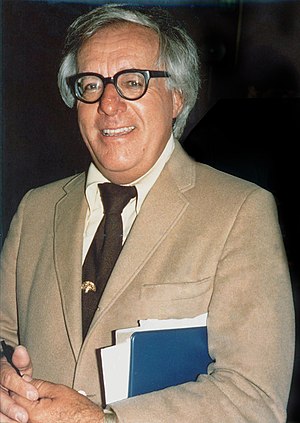Ray Bradbury: Difference between revisions
Pat Palmer (talk | contribs) mNo edit summary |
mNo edit summary |
||
| (2 intermediate revisions by one other user not shown) | |||
| Line 29: | Line 29: | ||
</references> | </references>[[Category:Suggestion Bot Tag]] | ||
Latest revision as of 06:01, 10 October 2024
Ray Douglas Bradbury (1920 - 2012) was an American science fiction and fantasy writer particularly remembered for his 1953 dystopian novel Fahrenheit 451 (made into a film in 1966) and the 1950 The Martian Chronicles (viewed either as a short story collection or a novel). A number of his works were adapted for film.
Beginnings
Ray Bradbury was born in Waukegan, Illinois, to a Swedish immigrant mother and a father who was a power and telephone lineman.[1] His paternal grandfather and great-grandfather were newspaper publishers. Bradbury was a reader and writer throughout his youth, spending much time in the Carnegie Library in Waukegan. His novels Dandelion Wine, Something Wicked This Way Comes, and Farewell Summer depict the town of Waukegan as "Green Town" and are semi-autobiographical. The Bradbury family lived in Tucson, Arizona, in 1926–27 and 1932–33 as his father pursued employment, each time returning to Waukegan, and eventually settled in Los Angeles in 1934, when Ray was thirteen. Bradbury graduated from Los Angeles High School in 1938 but chose not to attend college. Instead, he sold newspapers at the corner of South Norton Avenue and Olympic Boulevard. He continued to educate himself at the local library, and having been influenced by science fiction heroes like Flash Gordon and Buck Rogers, he began to publish science fiction stories in fanzines in 1938. His first paid piece was for the pulp magazine Super Science Stories in 1941, for which he earned $15.[2] He became a full-time writer by the end of 1942. His first book, Dark Carnival, a collection of short works, was published in 1947 by Arkham House. He married Marguerite McClure (1922–2003) in 1947, and they had four daughters.
A chance encounter in a Los Angeles bookstore with the British expatriate writer Christopher Isherwood gave Bradbury the opportunity to put The Martian Chronicles into the hands of a respected critic. Isherwood's glowing review followed and was a substantial boost to Bradbury's career.
Bradbury died of natural causes at his Los Angeles home on 5 June 2012.[3]
Honors and awards
- Ray Bradbury was given a star on the Hollywood Walk of Fame at 6644 Hollywood Blvd due to his contributions to the movie industry.
- An asteroid is named in his honor, "9766 Bradbury," along with a crater on the moon called "Dandelion Crater" (named after his novel, Dandelion Wine.)
- On April 16, 2007, Bradbury received a special citation from The Pulitzer Board, "for his distinguished, prolific, and deeply influential career as an unmatched author of science fiction and fantasy."[4]
- On November 17, 2004, Bradbury was the recipient of the National Medal of Arts, presented by President George W. Bush and Laura Bush. Bradbury has also received the World Fantasy Award life achievement, Stoker Award life achievement, SFWA Grand Master, SF Hall of Fame Living Inductee, and First Fandom Award. He received an Emmy Award for his work on The Halloween Tree.
- The "About the Author" sections in several of his published works claim that he has been nominated for an Academy Award. A search of the Academy's awards database proves this to be incorrect.[5] One short film he worked on, Icarus Montgolfier Wright[6] was nominated for an Academy Award, but Bradbury himself has not been.
Documentaries about Ray Bradbury
- Bradbury's works and approach to writing are documented in Terry Sanders' film Ray Bradbury: Story of a Writer (1963).
Provenance
- Some content on this page may previously have appeared on Wikipedia.
Notes
- ↑ Certificate of Birth, Ray Douglas Bradbury, August 22, 1920, Lake County Clerk's Record #4750. Although he was named after Rae Williams, a cousin on his father's side, Ray Bradbury's birth certificate spells his first name as "Ray."
- ↑ http://www.cnn.com/2006/SHOWBIZ/books/08/23/people.bradbury.ap/index.html]
- ↑ Staff writer. Author Ray Bradbury dies, aged 91, BBC News, British Broadcasting Corporation, 6 June 2012. Retrieved on 8 November 2013.
- ↑ 2007 Special Awards from the Pulitzer Prize website
- ↑ http://awardsdatabase.oscars.org/ampas_awards/BasicSearchInput.jsp
- ↑ Icarus Montgolfier Wright (1962). BFI Film & TV Database. British Film Institute. Retrieved on 8 November 2013.
